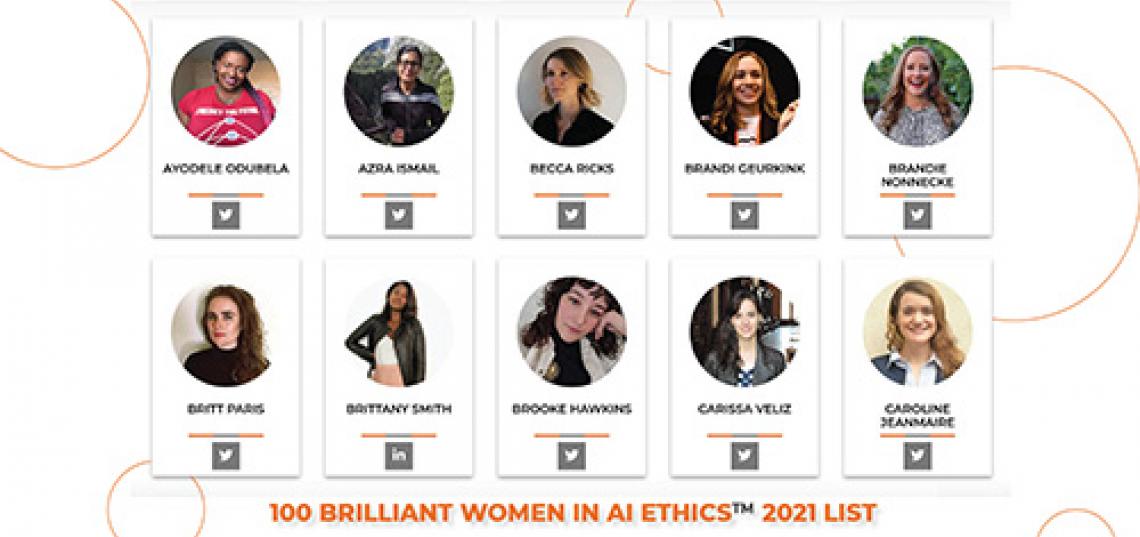
Assistant Professor Britt Paris is included on the “100 Brilliant Women in AI Ethics” list for 2020, in the “Roles and Rights” category, an honor recognizing her immensely important contributions to the global effort to advance the ethical and responsible use of emerging technologies such as artificial intelligence. The list is compiled by Lighthouse3, a research advisory firm that, according to its website, “helps global brands innovate responsibly with AI and emerging technologies.”
“I am honored to be on the list with such luminaries in AI ethics as Safiya Noble and Kate Crawford,” Paris said.
The selection methodology states that nominees must “self-identify as a woman; primarily focus on the ethics of Artificial Intelligence, specifically as it relates to robots and other artificial beings/systems; and actively promote the cause of ethical/responsible AI in their personal or professional capacity as an individual or as part of a larger organization.”
Paris is not sure who nominated her. “Part of my work is interested in critical ethical and policy questions around machine learning, and data science, and the industries that sustain these technical practices, but this is not my sole research focus. I speak at many public-facing events for technicians in the AI industry, policymakers and the like, so the nomination might have come from engagement with those events,” Paris said.
This initiative is particularly urgent and important right now, Paris said, because “ The people on this list are doing good work to try to reign in, subvert, or abolish the tech industry as it stands, with the means we have available to us. The news is full of examples of harmful AI that includes Facial Recognition Technology which is used in ways that disproportionately harm Black communities, punitive actions that result from incorrect algorithmic models for assessing unemployment fraud, and countless others. You may have seen in the news that last week Google fired its top AI ethics researcher, Timnit Gebru, over a paper she co-authored that called out Google's harmful algorithms. Gebru’s dismissal rekindled concerns about large scale discrimination on the basis of race, gender, and sexuality is particularly rampant at Google in the technology they develop as in the company itself, as it is in much of the tech industry. The FTC and 48 states attorneys general are suing Facebook for anti-trust issues that have resulted in stripping user privacy in favor of profit, and foreclosing on other platforms that might operate with goals other than padding the bottom line.
“When I talk about AI ethics, I am talking about issues of systemic power and injustice and how these are baked into the way tech industry works, how it sets its directives, and whose interests it serves and who is exploited in the process of the tech industry's unbridled pursuit of profit, as well as the assumptions around AI and ML and how they are produced, developed, deployed, and used. It's important to raise these issues and intervene in meaningful ways at this juncture in time. Tech platforms have expanded their harmful practices for years and now have been granted carte blanche during the pandemic. Our institutions have largely left us high and dry and tech is itching to step in and commodify every last bit of life. Political problems cannot be solved through technical fixes. Political problems require political solutions. Instead of uncritically turning to tech to solve these problems, we need to rethink our relationships to technology, what it can and cannot do for us, and what types of technology governance and value configurations will be compatible with the future we want.”
Paris is a critical informatics scholar who uses methods from discourse analysis and qualitative social science to study how groups build, use, and understand information systems according to their values, and how these systems influence evidentiary standards and political action. Her research and teaching emphasize the following themes: interrogating contemporary discourse and practice around using data-driven technology to solve growing social, political, and environmental problems; uncovering ethical and aesthetic assumptions built into Internet infrastructure; understanding the labor, economics, and systems of power that undergird today’s information and communication landscape; and pro-social information systems design.
More information about the Library and Information Science Department at the Rutgers School of Communication and Information is on the website.
Image credit: Lighthouse3
